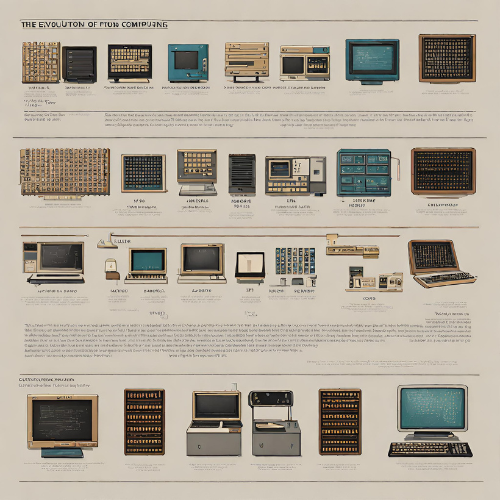The Evolution Of Computers: From Abacus To Artificial Intelligence

Introduction
The history of computers is a remarkable journey that spans centuries, from ancient counting tools to sophisticated artificial intelligence systems. This narrative unveils the fascinating story of how human ingenuity and technological advancements converged to shape the digital world we live in today.
I. Ancient Calculating Devices: The Precursors
-
Abacus and Calculating Tools (3000 BCE - 1600s CE)
- Explore the invention and usage of the abacus, the earliest known counting tool.
- Discuss other ancient calculating devices like the Antikythera Mechanism, an ancient Greek analog computer.
-
Blaise Pascal and Mechanical Calculators (17th Century)
- Introduce Blaise Pascal's Pascaline, a mechanical calculator considered one of the first digital calculators.
- Explore the contributions of other inventors, such as Gottfried Wilhelm Leibniz, to early computing devices.
II. The Birth of Modern Computing: Mechanical to Electronic Era
-
Charles Babbage and Analytical Engine (1837)
- Discuss Charles Babbage's visionary design of the Analytical Engine, an early mechanical general-purpose computer.
- Explore Ada Lovelace's contributions as the world's first computer programmer.
-
Hollerith's Tabulating Machine and Early Data Processing (Late 19th Century)
- Examine Herman Hollerith's invention of the punched card tabulating machine, used for processing census data.
- Discuss the impact of tabulating machines on data analysis and business operations.
-
Electronic Era Begins: Vacuum Tubes and Early Computers (1930s - 1940s)
- Introduce electronic computers like the Atanasoff-Berry Computer (ABC) and the Electronic Numerical Integrator and Computer (ENIAC).
- Explore the role of vacuum tubes as electronic switches, paving the way for modern computing.
III. The Digital Revolution: Transistors, Microprocessors, and Personal Computers
-
Transistors and Miniaturization (1950s - 1960s)
- Discuss the invention of transistors and their role in replacing bulky vacuum tubes.
- Explore the development of mainframe computers and their applications in scientific research and business.
-
Microprocessors and Personal Computers (1970s - 1980s)
- Introduce the invention of microprocessors and the birth of personal computers, including the Altair 8800 and Apple I.
- Discuss the impact of companies like IBM and Microsoft in shaping the personal computer industry.
-
Graphical User Interfaces and Internet Age (1980s - 1990s)
- Explore the development of graphical user interfaces (GUIs) and operating systems like Windows and macOS.
- Discuss the advent of the Internet, its growth, and the birth of the World Wide Web.
IV. Modern Computing: Mobile Devices, Cloud Computing, and Artificial Intelligence
-
Mobile Devices and Smartphones (2000s - Present)
- Discuss the evolution of mobile devices, from basic cell phones to smartphones and tablets.
- Explore the impact of mobile apps and the rise of mobile computing.
-
Cloud Computing and Virtualization (2000s - Present)
- Introduce cloud computing technology, allowing remote data storage and access.
- Discuss virtualization technologies and their role in optimizing hardware resources.
-
Artificial Intelligence and Machine Learning (2010s - Present)
- Explore the advancements in artificial intelligence (AI) and machine learning (ML) algorithms.
- Discuss applications of AI in various fields, including natural language processing, image recognition, and autonomous vehicles.
Conclusion
The history of computers is a testament to human innovation and determination to solve complex problems. From ancient abacuses to powerful artificial intelligence systems, each milestone represents a leap forward in our understanding of computing. As we continue to push the boundaries of technology, the future promises even more groundbreaking advancements, shaping the way we live, work, and interact with the world around us. The evolution of computers mirrors the evolution of human ingenuity, reminding us of our capacity to innovate, explore, and transform the world through the power of computation.